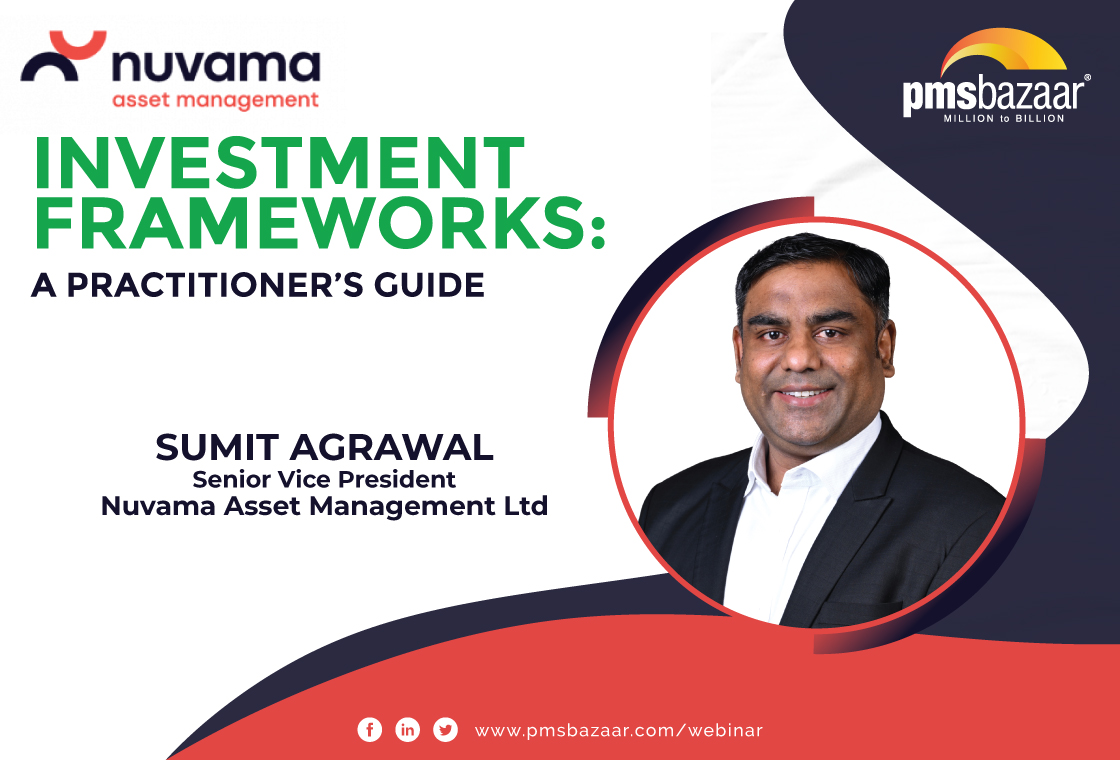India is at cross-roads. Massive disruptions in the financial sector await. The conventional business model of poorly run banks, including the public sector lenders and opaque private sector NBFCs, is ripe for a reset. Read on to Know more..

India is at cross-roads. Massive disruptions in the financial sector await. The conventional business model of poorly run banks, including the public sector lenders and opaque private sector NBFCs, is ripe for a reset. The tap for getting money, either from the government, or channelling hard-earned savings of citizens through domestic institutions, is running dry. While Air India’s quietus took 30 years, poorly run financial lenders will be left by the wayside in half the time. For nimble-footed investors, it is time to rally behind the first among of equals - prime financial companies that have business models built to last, efficient capital allocation and moats in business that are deep and high, says the Marcellus PMS team comprising Saurabh Mukherjea, Pramod Gubbi and Tej Shah, in a exclusive webinar with PMSBazaar. In this article, we will find out a nifty way to profit from 3 key upcoming triggers that are set to transform the financial landscape.
Disruption in PSU banks
The coronavirus, if nothing at all, has hastened the process of the demise of poorly run public sector banks. For long, the business model of such lenders was to get capital from the government and run their business. There was very little shareholder return created by the group in the last 20 years. Tax payer ran these sub-optimally run banks, which fit in the socialistic agenda of previous regimes. With Covid-19, the months long moratorium hides the real picture. When the moratorium is lifted and borrowers have to repay, PSU banks will discover, at great pain to them and their stakeholders, the problems lying underneath. Previously, such situations were managed because the Government bailed them out and such banks got a new expiry date. But, that joy run had to end some day. The present regime lacks the resources to inject massive doses of capital in SOE banks. Also running bad banks isnt their top agenda. This means PSU banks will slowly be neutralized due to the paucity of capital. 65% of Indian banking market share lies with PSU banks and when that share is up for grabs, it will go to the likes of private sector lenders like HDFC Bank, Kotak Mahindra Bank etc. This once-in-a-generation market share transfer will create serious amount of wealth in favour of those lenders that win.
Winners in the financials sector are easy to spot. Good quality lenders tend to take gain market share post crisis. “There are only two factors to take a call on: a) will the lender be able to survive through the crisis without any bail-outs?; and b) will the lender have enough strength on the liabilities side of the balance sheet on the other side of the crisis to help accelerate loan book growth and lead the consolidation of market share once the crisis is behind us?,” says Tej Shah.
The well-funded lenders are able to absorb any NPA blow and therefore are amongst the ‘last men standing’, and also the ‘first among equals’. At the moment, once India’s Covid-19 outbreak is over, competition will reduce for well-funded lenders. Thus, their loan book growth will accelerate because of their best quality liabilities franchise. Their NPA ratios will fall materially. Their NIMs will expand as these lenders will be able to pick and choose borrowers. “P/E multiples compression will fully reverse and earnings will grow at an accelerated pace,” adds Shah.
Thuggish NBFCs gasp for capital
Anyone who has spent some time in the Indian markets, knows one sordid fact. A large number of companies use creative accounting practices. This would have gone on for many more years. But, IL&FS defaults happened. Then, DHFL crisis happened. Regulators started tightening the screws. It has become progessively difficult to cook the books. With the risks of lending to such NBFCs now clear after in March a large mutual fund house taking hit in its six schemes, thuggish NBFCs are in the cross-hairs.
With Covid-19 and the ensuing monetary conditions, money isnt cheap for poor quality NBFCs with opaque businesses. Investors who use forensic accounting can easily find these potential wealth destroyers. Marcellus, for example, uses 11 accounting ratios covering income statement (revenue/ earnings manipulation), balance sheet (correct representation of assets/liabilities), NPA recognition and audit quality checks.
Six years of historical consolidated financials are checked. At the outcome level, a final pecking list on accounting quality for stocks is prepared. All this helps. DHFL was rated as D10 (worst score) in Marcellus forensic score based on the analysis of its FY13-FY18 annual report i.e. well before its collapse in FY19. The major red flags pointed out by our forensic framework related to upfronting of income i.e. high fee income, earning from non-core income i.e. high treasury income and multiple adjustments in the P&L i.e. change in reserves as a % of PAT not equalling 100%
But DHFL is not the last one. One does not need to talk about the long list of dubious NBFCs that populate India’s non-bank lending landscape. The good news is such companies will find it difficult to survive. “Bajaj Finance, the leader of consumer finance in India, is meanwhile in a sweet spot. The data oriented lender is now able to raise capital much cheaper than even its well-run competitors. This means companies like Bajaj Finance, already on a strong footing, will just pull ahead of rivals based on lower cost of funding and high return ratios. And, the stock market allows you to profit from this trend,” avers Saurabh.
Financialization of assets, savings
India has 10 trillion dollars in household savings, but financial assets for 5% of it. But, things are changing. Hordes of investors today realize the futility of putting dollops of money into real estate and gold. Thus, financial assets and savings is in the order. In another 10 years, the share of such assets is expected to triple in the overall pie.
The growing trend for financial assets and savings means top quality insurers, asset managers, brokers etc. will gain big. From a portfolio perspective, a lender only basket looks risky. Non lenders in the financial sector derisk such a portfolio.
Life insurers and general insurers, for example, offer lower standard deviation than Bank Nifty. Asset managers and brokers enjoy an unlevered business, with no balance sheet risk. This means adding them to a financials portfolio is value-for-money.
Broadly speaking, wealthy investors need a clean, transparent way to profit from the 3 triggers/consolidations in the largest sector of the stockmarket -- the financials.
Marcellus PMS’ new strategy Kings Of Capital is building a innovative multi-cap portfolio of financial stocks which includes not only lenders but also general insurers, life insurers, asset managers and brokers. As equity markets trend upwards in the long run, lenders in the portfolio add a high beta element to the portfolio which helps it outperform the broader indices over the long term.
The non lending part of the portfolio adds resilience to the portfolio during times of stress because insurers have a lower beta than lending businesses while asset management and brokerage businesses do not take any balance sheet risk, says Tej.
A model well-known
Ever since Marcellus’ inception in 2018, the company has delivered 2 strategies - Consistent Compounders and Little Champs. These have given 3000+ investors benchmark beating returns. The secret sauce has been stock selection. In the newly launched ‘Kings of Capital’ strategy, the investing process is customized to uncover the best of financial ideas. Because the core investment team of Marcellus has worked together for 15 years, the ‘start-up’ asset manager has hand-crafted some stunning results. In two years time, it has breezed into the upper echelons (top-15 club) of PMS industry. So, it is important to listen to them when they come with a new investment idea.
The Kings of Capital portfolio will focus on 10 to 14 high quality financial companies with clean books of accounts, a long historical track record of prudent capital allocation and high barriers to entry. These firms are gaining market share in the wake of the multiple disruptions caused in the Financial Services industry over the past few years.”In common with Marcellus’ other successful offerings – Consistent Compounders and Little Champs – Kings of Capital too will be built using Marcellus’ proprietary forensic accounting and capital allocation models,” says Pramod.
Marcellus is offering the new portfolio in a PMS construct with zero entry/exit load and with no lock-in. The portfolio will be benchmarked to the Nifty Banks index. Fee options are Fixed and Hybrid, adds Pramod.
Those who missed the opportunity to hear from the Experts directly can listen to the entire session through the appended link:
For more information, please contact info@pmsbazaar.com
Recent Blogs

January Rout, Extreme Dispersion: PMS Returns Swing From Losses to Gains
Benchmark falls deepened losses, but multi-asset and debt cushioned portfolios meaningfully

Investment Frameworks : A Practitioner’s Guide
PMS Bazaar recently organized a webinar titled “Investment Frameworks: A Practitioner’s Guide,” which featured Mr. Sumit Agrawal, Senior Vice President, Nuvama Asset Management Limited. This blog covers the important points shared in this insightful webinar.

Aurum Multiplier Portfolio - Where Small and Mid-Cap Alpha Meets Large-Cap Stability
PMS Bazaar recently organized a webinar titled “Aurum Multiplier Portfolio - Where Small and Mid-Cap Alpha Meets Large-Cap Stability,” which featured Mr. Sandeep Daga, MD& CIO, Nine Rivers Capital and Mr. Kunal Sabnis, Portfolio Manager, Nine Rivers Capital. This blog covers the important points shared in this insightful webinar.

Flat Markets, Wide Outcomes: How 484 PMS Strategies Performed in Dec 2025
December 2025 was a month where market returns stayed close to flat, with the Nifty 50 TRI at -0.28% and the BSE 500 TRI at -0.24%.

Equity Markets 2026: Outlook, Risks and Strategy
PMS Bazaar recently organized a webinar titled “Equity Markets 2026: Outlook, Risks and Strategy,” which featured Mr. Ashish Chaturmohta, MD & Fund Manager – APEX PMS, JM Financial Limited. This blog covers the important points shared in this insightful webinar.

MICRO CAPS: The Dark Horses of the Indian Equity Market
PMS Bazaar recently organized a webinar titled “MICRO CAPS: The Dark Horses of the Indian Equity Market,” which featured Mr. Rishi Agarwal and Mr. Adheesh Kabra, both Co-Founders and Fund Managers, Aarth AIF. This blog covers the important points shared in this insightful webinar.

Finding Clarity in Volatile Markets: A Large-Cap Led ASK CORE Strategy
PMS Bazaar recently organized a webinar titled “Finding Clarity in Volatile Markets: A Large-Cap Led ASK CORE Strategy,” which featured Mr.Anunaya Kumar, President – Sales and Distribution ASK Investment Managers Limited. This blog covers the important points shared in this insightful webinar.
.jpg)
Passively Active Investing — A Modern Investor’s Lens on ETF-Based PMS
PMS Bazaar recently organized a webinar titled “Passively Active Investing — A Modern Investor’s Lens on ETF-Based PMS,” which featured Mr. Karan Bhatia, Co-Founder and Co-Fund Manager , Pricebridge Honeycomb ETF PMs. This blog covers the important points shared in this insightful webinar.

